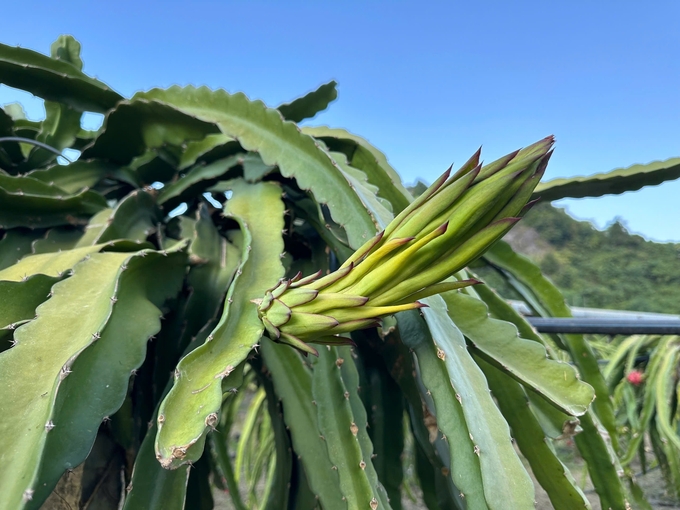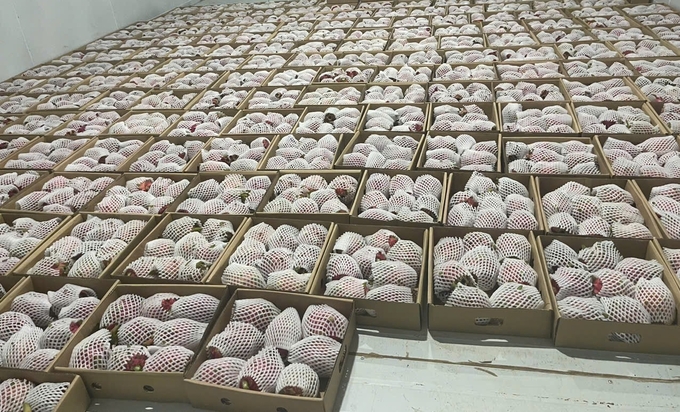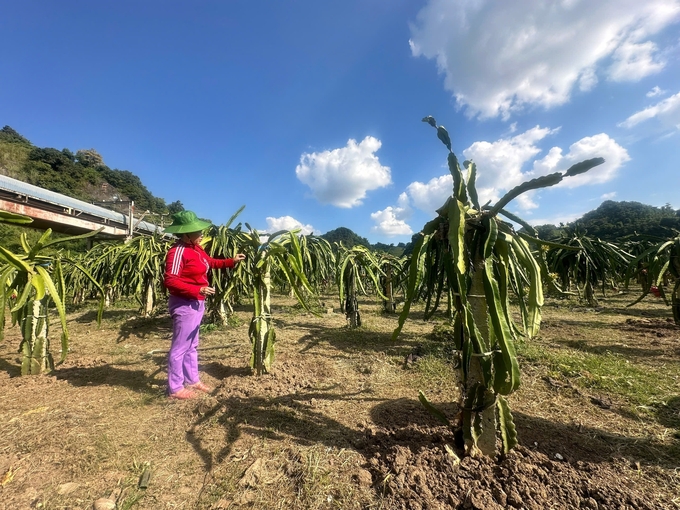May 31, 2025 | 13:17 GMT +7
May 31, 2025 | 13:17 GMT +7
Hotline: 0913.378.918
May 31, 2025 | 13:17 GMT +7
Hotline: 0913.378.918

Son La has very favorable conditions for the development of dragon fruit cultivation. Photo: Duc Binh.
After an organic dragon fruit workshop in 2017, foreign traders were astonished by the intense sweetness of the dragon fruit from Ngoc Hoang Cooperative (Na Bo commune, Mai Son, Son La).
Mrs. Nguyen Thi Dung, the Deputy Director of Ngoc Hoang Cooperative, shared with pride, “That year, we displayed six samples from various provinces. While our dragon fruit may not have been the most visually appealing, its exceptional sweetness surprised everyone. The foreign guests devoured every piece and immediately expressed interest in purchasing them because they were so impressed".
One guest from Singapore was particularly eager to find red-fleshed dragon fruit in Son La and was even willing to put down a significant deposit to secure a supply. However, at that time, very few people believed in the potential benefits that dragon fruit cultivation could bring.

Post-harvest preservation is a crucial step for the export of dragon fruit. Photo: Duc Binh.
Son La is often referred to as a "giant air conditioner" of the Northwest region, characterized by a variety of microclimates where daytime and nighttime temperatures differ by 4 to 5 degrees Celsius. The hilly terrain creates an ideal environment for the cultivation of dragon fruit. Taking advantage of these favorable conditions, Ngoc Hoang Cooperative has successfully produced high-quality dragon fruit that meets the stringent requirements for export to the European Union market.
To facilitate exports, a rigorous inspection process is in place. Numerous foreign delegations travel to Vietnam to collect soil and water samples, meticulously documenting production practices, including the frequency of organic pesticide applications and care procedures. Following the harvest, the cooperative is required to send 6 to 8 samples to Ho Chi Minh City for further testing. Only after these samples meet all necessary standards can the dragon fruit be exported.
Mrs. Nguyen Thi Dung, the Deputy Director of Ngoc Hoang Cooperative, shared her insights, saying: “In the past, when I didn't have a firm grasp of agricultural knowledge, I would resort to using chemical pesticides, spraying them whenever I noticed aphids or pests. However, I have since learned to adapt my practices. Now, I carefully research fertilizers to ensure they do not harm the soil or the plants. The methods I employ to deter insects are quite simple and harmless. For example, I use ingredients like lemongrass, chili, and finely chopped garlic soaked in alcohol, which are effective yet non-toxic.”

Dragon fruit is cultivated organically at Ngoc Hoang Cooperative. Photo: Duc Binh.
According to Mrs. Dung, after harvesting, dragon fruit must be meticulously sorted by size, categorizing them into groups that weigh between 300 and 800 grams to meet specific market requirements. The process of ensuring hygiene is just as crucial; if any pests or ant eggs are present, they must be carefully removed using a spoon, followed by rinsing the fruit with clean water. Afterward, the fruit is dried with a machine and wiped down with alcohol before it is finally wrapped for export.
The dragon fruit is then packed into foam boxes and transported to storage facilities where the temperature is maintained between 2 to 4 degrees Celsius. It is vital to adhere to every step of this process, as even a small mistake or the presence of insects on the fruit can lead to the entire shipment being returned.
To date, the cooperative has successfully exported hundreds of tons of dragon fruit to various countries in the European Union, as well as to Japan and South Korea via air transport. Despite these successes, exporting to China poses significant challenges, even though it is considered a promising market. To access the Chinese market, it is essential to comply not only with the requirements for a planting area code but also with regulations concerning the packing facility code. Unfortunately, in Son La, there are still not many companies willing to invest in meeting these standards.
Translated by Phuong Linh

(VAN) Seafood by-products are opening a new path, combining green growth and technological innovation to enhance the industry's value.

(VAN) Mr. Nguyen Thanh Cong, Vice Chairman of the Son La Provincial People's Committee, reflects on Son La’s journey from barren hills to fruitful orchards after a decade of hard work.

(VAN) FAO’s Director-General addresses the 5th Baghdad International Water Conference.
/2025/05/26/1716-4-nongnghiep-191706.jpg)
(VAN) Chain linkages, technological innovation, and raw material zoning are three strategic pillars for the coconut industry to strongly develop and elevate its position on the global agricultural map.
![Advanced mariculture – an inevitable trend: [4] Accompanied by scientists](https://t.ex-cdn.com/nongnghiepmoitruong.vn/608w/files/sohk/2025/05/13/1941-pgsts-vo-van-nha-140958_717.jpg)
(VAN) According to Assoc. Prof. Dr. Vo Van Nha, Director of the RIA III, the development of advanced offshore mariculture is no longer an option but an essential path for Vietnam’s fisheries sector.

(VAN) Vietnam is intensifying the development of mollusk farming areas that meet international standards, aiming for sustainable growth and enhancing its export position in the global seafood market.
![Advanced mariculture – an inevitable trend: [3] Policy-driven momentum](https://t.ex-cdn.com/nongnghiepmoitruong.vn/608w/files/doanhtq/2025/05/21/0104-0616-0348-nuoi-bien-170339_789.jpg)
(VAN) To ensure the success of offshore mariculture that uses advanced technologies, it is essential to establish supportive policies that inspire both individuals and enterprises to invest with confidence.